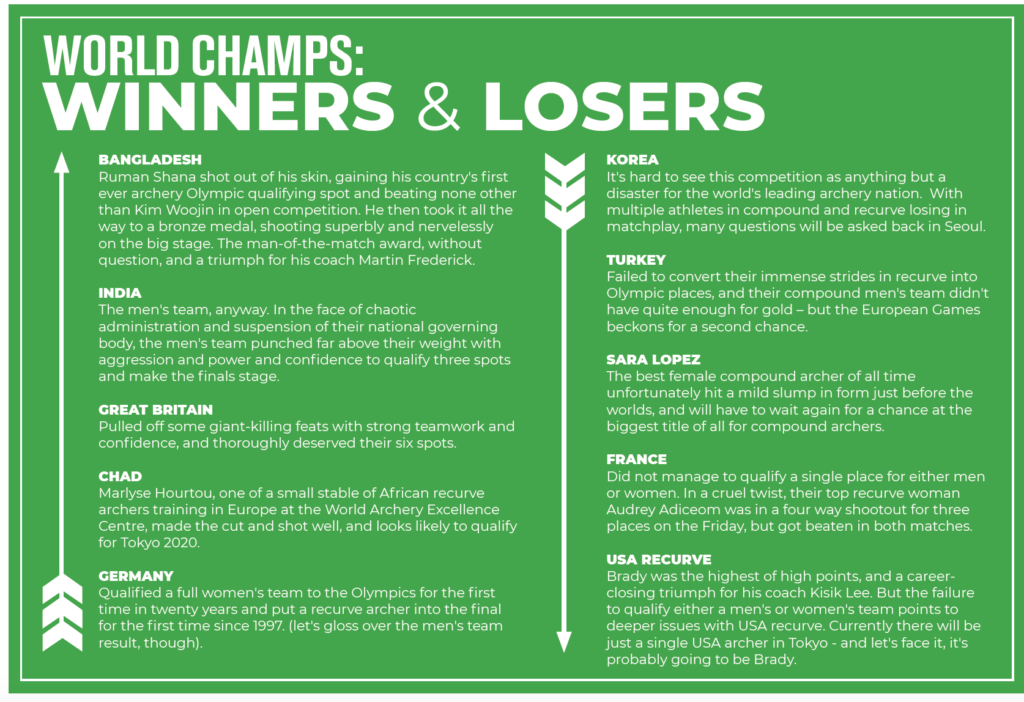
The 2019 Hyundai World Archery Championships in ‘s-Hertogenbosch, Netherlands was by some distance the biggest major international archery tournament ever held. The total runners were 590 from 88 countries – 200 recurve men, 153 recurve women, 139 compound men and 98 compound women – and it also served as the main Olympic qualifier for teams and a handful of individuals. (Note – it was preceded by the Para Championships, held in the same venue. We decided to give that its own space, so Bow will have a full report about that in the next issue.)
For many nations and squads, the Olympic places was the real driver for attendance. In recurve archery gaining an spot and then competing for your country remains the reference point for the rest of the world – and also, for gaining funding from central government. Coming home with three spots for Tokyo is, on a national level, at least as important as winning a championship medal, and in terms of a career, often more so. Many international teams stayed on in Europe after the recent Antalya World Cup specifically to prepare for this.
The competition saw a colourful line-up of archers from nations rarely seen in international archery including Chad, Tonga, Qatar, Guyana, Sudan, the Virgin Islands, Fiji, San Marino, Namibia – and even a full compound team from the Faroe Islands.
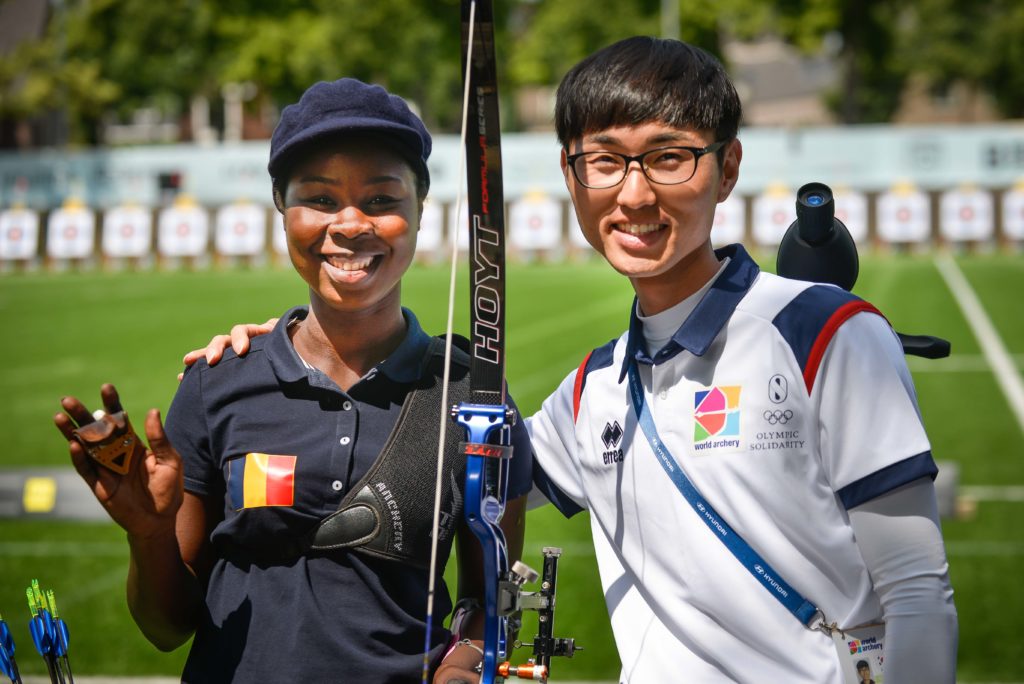
The huge numbers made even qualifying for the championship a major task. With 200 recurve men and just 104 places in the main draw available, a lot of people’s championships ended very early indeed. For the Korean men’s team, there was drama from the start, as their youngest star Lee Woo Seok was ill and spent official practice in a local hospital, being scanned for all sorts of things. Qualifying a full team is so vital that the Koreans had another athlete, Bae Jae Hyun, sprint for the airport with his bow on the Sunday. He was apparently through security and sitting in the lounge when the call came that Woo Seok was well enough to shoot – and shoot he did. Looking pale and drawn, he still managed to put away a score of 696 to finish first.

The cut to make the men’s matchplay stage of the tournament was an astonishing 645 points – four years ago it was 624. There was a six-way shoot-off for the last spot, which Portugal’s Tiago Matos won; victims of the cut included former Olympic champion Victor Ruban. The top recurve men’s seed at the last world championships scored 676 – here, in good weather, 12 men went over 680. The women’s qualification was equally strong and in still conditions, Kang Chae Young managed to beat her record from last year by a single point, with 692. In compound qualification, which had less pressure of numbers but every major international archer attending, the tables were topped by Kim Jongho with 714 and Tanja Jensen with 708.
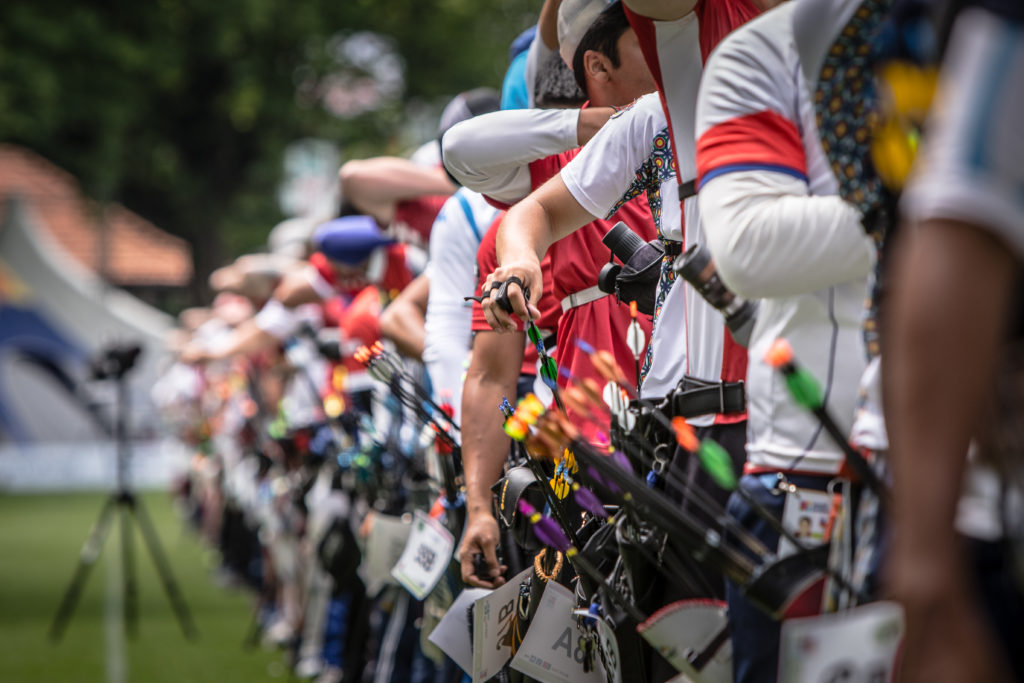
The first part of the week is all about recurve teams, and there were some high-profile casualties in the first match including the USA women and the German and Russian men. The stage was set for Wednesday’s team match which perms eight teams from the final sixteen in each gender. Winning it meant winning three spots for Tokyo (for the nation, rather than individually). The bright and still weather of the first few days suddenly turned extremely nasty in the morning and most teams had to practice in torrential rain under dark skies. Things cleared up – a little – by the afternoon. The tension ratcheted up for three practice ends, as most nations assembled a noisy rail of supporters behind the field. The critical matches – men first, then women – were held in a deafening roar of support with athletes being far more demonstrative than usual. After the fist pumping and shouting had ended, it looked like the end of a football World Cup knockout stage, with jumping up and down and screaming and people curled into balls on the floor of tents.

When the dust had settled, China, Chinese Taipei, Great Britain and Korea had secured full quotas, winning spots in both the men’s and women’s team events at Tokyo 2020. Australia, India, Kazakhstan and the Netherlands won men’s team places, and Belarus, Germany, Russia and Ukraine won women’s team places. The major losers included France, Italy and Mexico, who walked away empty-handed. As the knockout competition progressed, individual spots were awarded to Ruman Shana of Bangladesh, Khairul Anuar Mohamad of Malaysia, Mauro Nespoli of Italy, Brady Ellison of the USA, Alexandra Mirca of Moldova, Maja Jager of Denmark, Alejandra Valencia of Mexico and Christine Bjerendal of Sweden – the last three in a tiny shootdown competition on the Friday morning.

On finals day the competition, mostly held on a cramped rugby field called The Dukes in a park in the south of the city, shifted across to the main square of ‘s-Hertogenbosch next to the cathedral. A stand for thousands of spectators and a giant VIP area for the great and good of the town (and a who’s who of international archery in the past few decades) had been set up – and luckily the weather stayed almost perfect.

Compound Saturday was a little short on really thrilling competition, it has to be said, but was an entertaining day of archery. The men’s final was unusual in that neither archer was a pro, with James Lutz arriving at the championships ranked 24th in the world, and young Norwegian Anders Faugstad 70th. From low qualifications, both rose through the field to make the last two. The last time a Norwegian archer contested a world championship title was in 2005 in Madrid when the legendary Morten Boe lost to the equally legendary Morgan Lundin. This time, Morten Boe was behind the scope as a coach to Faugstad. However, the Norwegian, so confident in the knockout rounds, seemed to blink on his first big stage. Lutz reproduced the nerveless form he produced in Antalya when he shot a 150 in his first international finals match. It wasn’t perfect this time, but it was good enough, and Lutz became the first compound man from the USA to lift the trophy since Reo Wilde a decade ago – with fourth place finisher Braden Gellenthien turning straight around and coming back out to coach Lutz for the win.

In the women’s competition, Paige Pearce and Natalia Avdeeva both had world champion titles to their names – Pearce as the reigning field archery world champion, and Adveeva as the reigning indoor archery world champion – a crown she will retain indefinitely as it was recently decided that the 2018 indoor championships would be the last. With the now-rare sight of both Natalia and Paige shooting an index finger trigger release, Pearce opened with three nines, allowing the Russian world number 33 to take an early one point lead. It seemed like she would streak ahead, but both were scrappy until Pearce seized back momentum by going clean in the third end. Again, Natalia edged ahead in the fourth – and she hung on, needing a maximum with her final arrow to take victory. It landed – she turned to face her coach, asked for confirmation of the win, and let out a victory scream. The gold medal makes the experienced Russian the reigning indoor and outdoor world champion, and also the first Russian archer to hold a compound world title since Albina Loginova did so back-to-back in 2009 and 2011.
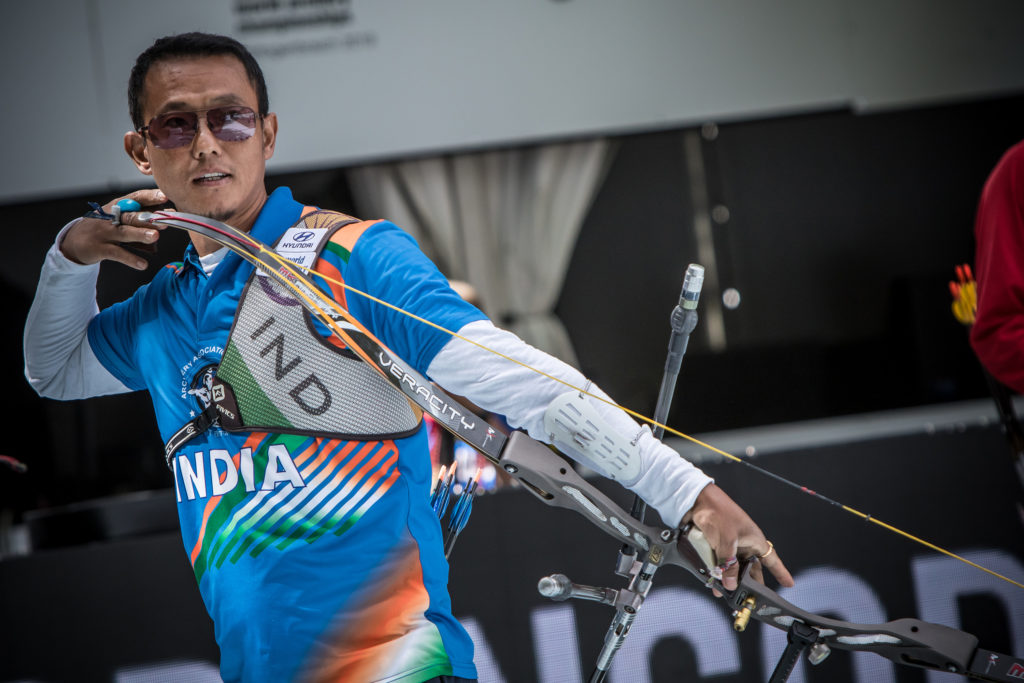
On recurve Sunday, the usual script of ‘Korea win everything’ went firmly out the window. The Korean women’s team – on paper, one of the more extraordinary teams ever assembled – lost to disciplined, focused and tactically aware shooting from Chinese Taipei, who finally and deservedly got one over on their main rivals.
The stage was very much set for the women’s individual final among the Asian superpowers. Kang Chae Young of Korea had not lost a match internationally in 2019, but Lei Chien-Ying of Chinese Taipei had been in impeccable form during eliminations at this tournament, finishing three of her four matches with perfect sets of 30 points.
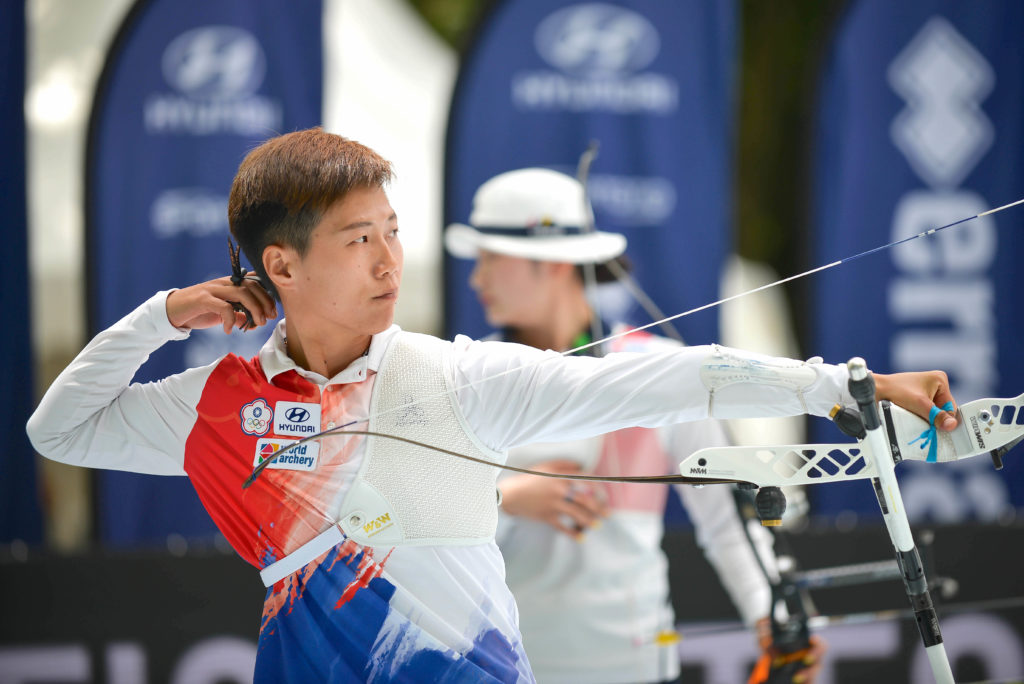
Both women were on their third of three appearances on the stage after their team and mixed team medal matches.They each won a set of the final before splitting the third, both shooting 29 points. A nine and two eights from Lei in the third swung the momentum back towards the Korean. But in the fourth, Kang seemed to tense up, as Lei closed with a 10 to take the points with a 29 and draw the match level. You sensed that the ultra-competitive Lei was more up for the challenge of the shootoff. Kang shot first, usually considered an advantage. She sent a seven low and left – easily the worst arrow she had shot all tournament. Lei stepped up and shot a nine – a bad nine, but it was enough. It was a superb breakthrough performance from the world’s second team.
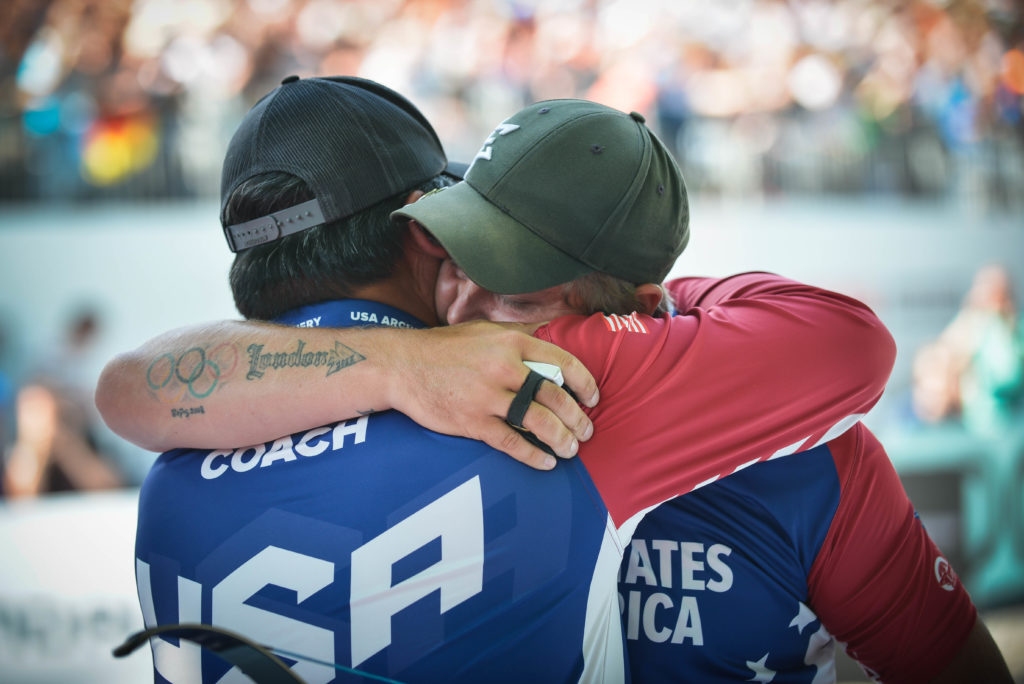
The competition closed with Brady Ellison beating Khairul Anuar Mohamad of Malaysia with a perfect arrow to become the first recurve men’s world champion from the USA since Rick McKinney in 1985. While Brady was the overwhelming favourite in the final, having crushingly dominated two stages of the World Cup this year, his opponent – a perennial dangerman on the circuit – shot like he had nothing to lose and with a quality that proved he deserved to be on the top step. The first three sets were tied up. Brady took the fourth, Khairul won the fifth, and like the women’s final, the world championship men’s match went to a shoot-off. Brady’s arrow was perfect, Khairul’s was a bad eight.
Khairul’s silver is the first Malaysian medal in the history of the World Championships, as is Ruman Shana’s bronze for Bangladesh. But Brady Ellison’s win was entirely deserved and caps an extraordinary recurve career – which is certainly not over yet (even if he has threatened several times to pack it all in and return to his compound roots). It was a fitting end to a superbly handled and intrigue-filled World Championships, the biggest festival of archery ever – which showed again what the sport is capable of. ⤐
